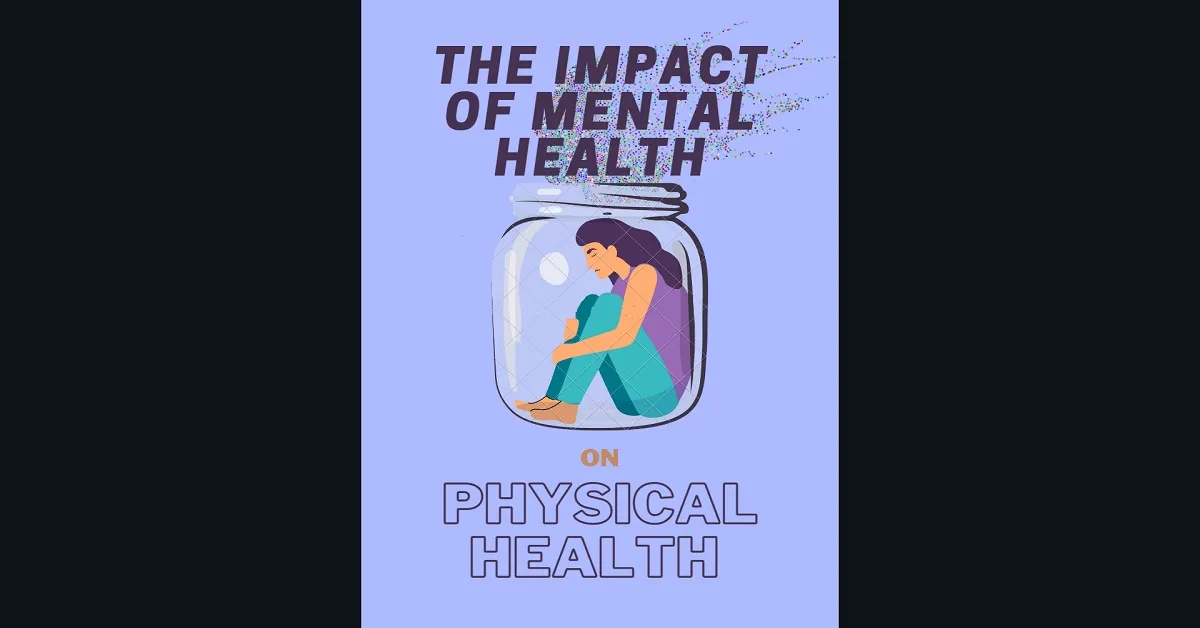Introduction
In today’s fast-paced world, it’s crucial to prioritize both mental and physical health. These two aspects of well-being are closely interconnected, with each influencing the other in profound ways. Recognizing the impact of mental health on physical health and vice versa is essential for leading a balanced and healthy life.
Mental Health’s Impact on Physical Health
-
Stress and Its Effects on the Body Stress, if left unmanaged, can take a toll on both mental and physical health. Chronic stress can lead to increased blood pressure, heart problems, weakened immune system, and digestive issues.
-
Depression and Its Physical Symptoms Depression often manifests not only as emotional distress but also as physical symptoms such as fatigue, changes in appetite, and sleep disturbances. It can also contribute to conditions like chronic pain and headaches.
-
Anxiety and Its Impact on the Body Anxiety can lead to a range of physical symptoms, including rapid heartbeat, shortness of breath, muscle tension, and gastrointestinal problems. Prolonged anxiety can weaken the immune system and increase the risk of cardiovascular issues.
-
Psychosomatic Disorders Psychosomatic disorders are conditions in which psychological factors cause physical symptoms. Examples include tension headaches, irritable bowel syndrome (IBS), and fibromyalgia.
Physical Health’s Impact on Mental Health
-
Chronic Pain and Its Psychological Effects Living with chronic pain can have a significant impact on mental health, leading to symptoms of depression, anxiety, and decreased quality of life.
-
Chronic Illnesses and Mental Health Managing chronic illnesses can be emotionally challenging, often leading to increased stress, anxiety, and feelings of helplessness. Mental health support is crucial in coping with the psychological effects of these conditions.
-
Lifestyle Choices and Mental Well-being Engaging in healthy lifestyle choices such as regular exercise, balanced nutrition, and sufficient sleep positively impacts mental health by reducing the risk of mental disorders and promoting emotional well-being.
-
Sleep and Mental Health Quality sleep is essential for maintaining good mental health. Sleep problems, such as insomnia or sleep apnea, can contribute to the development or worsening of mental health conditions like depression and anxiety.
The Bi-directional Relationship
-
The Stress Response and Mental Health Excessive or chronic stress triggers physiological responses that can impact mental health, including changes in brain chemistry and the regulation of stress hormones like cortisol.
-
The Role of Inflammation Inflammation, a response triggered by physical health issues, can affect the brain and contribute to mental health disorders such as depression and anxiety.
-
The Gut-Brain Connection The gut and brain are interconnected through the gut-brain axis. An imbalance in gut bacteria, known as the gut microbiome, can influence mental health conditions such as depression and anxiety.
-
The Impact of Exercise on Mental and Physical Health Regular exercise not only improves physical health but also has a positive impact on mental well-being. Exercise releases endorphins, reduces stress hormones, and improves mood and cognitive function.
Strategies for Holistic Well-being
-
Self-care Practices Engaging in self-care activities such as mindfulness, relaxation techniques, hobbies, and social connections can enhance both mental and physical well-being.
-
Seeking Professional Help When experiencing mental health issues, it’s important to seek professional help. Mental health professionals can provide guidance, therapy, and support tailored to individual needs.
-
Maintaining a Balanced Lifestyle Balancing work, relationships, physical activity, and leisure time is essential for overall well-being. Prioritizing self-care and setting boundaries helps maintain a healthy balance.
-
Building a Support System Developing a strong support system of friends, family, and community can provide invaluable emotional support during challenging times. Social connections contribute to mental and physical well-being.
Conclusion
Understanding the reciprocal relationship between mental and physical health is crucial for leading a healthy life. By recognizing and addressing the impact of mental health on physical health and vice versa, individuals can take proactive steps to achieve holistic well-being. Prioritizing self-care, seeking professional help when needed, and maintaining a balanced lifestyle are key to nurturing both mental and physical health.
FAQs
-
How does stress affect both mental and physical health?
Stress can lead to physical symptoms such as high blood pressure, weakened immune system, and digestive issues. It also contributes to mental health disorders like anxiety and depression.
-
Can physical health issues contribute to mental health disorders?
Yes, chronic illnesses, chronic pain, and lifestyle choices can impact mental health, leading to symptoms of anxiety, depression, and decreased well-being.
-
What are some lifestyle changes that can improve both mental and physical well-being?
Engaging in regular exercise, maintaining a balanced diet, getting sufficient sleep, and practicing stress management techniques can positively impact both mental and physical health.
-
Is there a link between sleep problems and mental health?
Yes, sleep problems can contribute to the development or exacerbation of mental health conditions like depression and anxiety. Quality sleep is essential for good mental health.
-
How can exercise benefit mental health?
Exercise releases endorphins, reduces stress hormones, improves mood, and enhances cognitive function. Regular physical activity has a positive impact on mental well-being.




